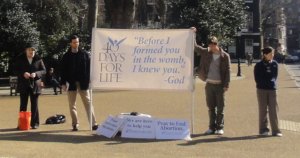We've defended reproductive rights from religiously motivated restrictions since our founding.
Religion should not stand in the way of reproductive healthcare.
A desire to restrict reproductive rights, and to control women's bodies, is a hallmark of religious fundamentalism. We strongly support the right of women to have legal and safe abortions and access to emergency contraception.
Since its founding the National Secular Society has supported reproductive rights. In 1878 our founder and vice-president were prosecuted for making information about birth control accessible to working class women.
Throughout the world, reproductive rights are still under threat from theocrats. While individual religious people hold diverse views on abortion, every stage of progress in reproductive healthcare has been fought by religious organisations. Often these have involved virulent campaigns of intimidation and misinformation.
84% of people in the UK believe abortion should be legal in all or most cases. This includes 76% of religious people and 94% of nonreligious people.
In the UK, emergency contraception can still sometimes be difficult to obtain. Some religious pharmacists have defied General Pharmaceutical Council guidance by refusing to sell it or even to dispense a prescription given to a woman after a consultation with her own doctor.
People of all religions and beliefs can have disagreements on the boundaries of bodily autonomy and reproductive rights. However, religious beliefs should not be used to restrict the bodily autonomy of other people.
Take action!
1. Share your story
Tell us why you support this campaign, and how you are personally affected by the issue. You can also let us know if you would like assistance with a particular issue.
2. Join the National Secular Society
Become a member of the National Secular Society today! Together, we can separate religion and state for greater freedom and fairness.
Latest updates
NSS calls for faith-based RSE to be included in review
Posted: Mon, 13 Mar 2023 16:58
The National Secular Society has urged the government to consider the potential harms caused by faith-based relationships and sex education (RSE) in its upcoming review of the subject.
Last week, prime minister Rishi Sunak ordered a review into RSE amid concerns some schools are using age-inappropriate resources or teaching contested ideas about gender in RSE lessons.
In a letter to Nick Gibb today, the NSS said this review should include an examination of faith-based RSE, as it has found many state-funded faith schools teach discriminatory religious dogma as part of their RSE curriculum.
In 2018, NSS research found many faith schools explicitly teach that same-sex relationships are wrong and criticise sex outside of marriage. Many condemn contraceptives and abortion, and some teach taboos around menstruation. These teachings contradict advice from healthcare and education professionals and are inconsistent with the Equality Act 2010.
State-funded faith schools are permitted to teach RSE in line with their "distinctive faith perspective on relationships". Even for state schools without a religious designation, the RSE guidance says: "In all schools, when teaching [RSE], the religious background of all pupils must be taken into account when planning teaching".
Schools without a religious character have frequently come under pressure from religious lobbying groups opposed to teaching about same-sex relationships. One such group, Parents United, recently hosted a conference where speakers told attendees gay children must be taught to 'repent'.
Last month, research by Just Like Us found one in three teachers says faith acts as a 'barrier' to discussing LGBT+ topics in school. Amongst those who work at faith schools, the number increased to almost half, with 46% feeling that faith impeded their ability to engage in open discussions.
NSS: Not considering faith-based RSE will "fail thousands of children"
NSS chief executive Stephen Evans said: "If the government is to review how ideologised teaching and resources lead to distorted, biased or inaccurate RSE, this must extend to religious ideology.
"A failure to consider how religious ideology distorts RSE will not only demonstrate inconsistency on this issue – it will fail thousands of children at faith schools who are being taught that it is wrong to use contraception and it is wrong to be gay.
"We therefore urge the government to include faith-based teaching of RSE within the scope of its review to ensure the curriculum is impartial, objective, inclusive and free from unscientific ideology of all kinds."
MPs reject religious exemptions for abortion safe access zones
Posted: Wed, 8 Mar 2023 15:47
The National Secular Society has welcomed a House of Commons vote to reject religious exemptions from 'buffer zones' protecting women attending abortion clinics.
Yesterday MPs agreed to safe access zones around abortion clinics as part of the Public Order Bill.
The bill will make it an offence for people to harass or distress patients and staff within 150 metres of abortion clinics. Trying to obstruct or deter women from accessing abortion services within safe access zones will also be banned.
"No prayer is being criminalised"
Additionally, MPs voted against an amendment, tabled by Conservative and DUP MPs, which would have explicitly permitted "silent prayer" or "consensual communication" in safe access zones.
MPs who backed the amendment referred to the case of Isabel Vaughan-Spruce, director of anti-abortion group March for Life UK, who has been arrested twice for breaching Public Spaces Protection Orders (PSPOs) outside abortion clinics while praying 'in her head'.
PSPOs can be used by local authorities to ban specific antisocial acts in designated areas. While PSPOs can explicitly ban prayer vigils outside abortion clinics, the Public Order Bill, which applies nationwide, makes no mention of prayers or other religious activity.
MPs who supported the safe access zones stressed that the bill would not criminalise prayer, but that including specific exemptions for "silent prayer" would risk creating a loophole to enable activists to harass women at abortion clinics.
Labour MP for Walthamstow Stella Creasy said: "Let us be very clear for the avoidance of doubt: no prayer is being criminalised. Nothing in the Bill will do that".
She added: "We need to be honest and recognise that there will never be a point at which the people praying agree with the choice that a woman has made, so there is never going to be a point at which their prayers are welcome. There is never going to be a point at which those prayers are not designed to intimidate or to destabilise a very difficult decision."
She pointed out that anti-abortion groups themselves boast that their presence make the no-show rate for abortion appointments as high as 75%.
Adding to Creasy's arguments, Labour MP for Croydon Central Sarah Jones said: "I am a person of faith. I have also walked into an abortion clinic. I pray, but I also know how intimidating it is to walk past people silently standing there with signs trying to communicate, trying to pray, trying to persuade women to change their mind. It is a balance that we strike in this place between a woman's right to privacy and healthcare and everybody's right to go about their business and do what they choose."
She also objected to the exemption of "consensual communication" from the safe access zones in the amendment, saying: "How on earth can we define it? Members have said women should not be harassed. Everybody agrees with that, but one person's consensual communication is another person's harassment."
The bill is now set to become law. Similar legislation was passed in Northern Ireland last year, while a member's bill to create buffer zones has been launched in Scotland.
NSS: Exemptions for 'silent prayer' would create "an easily exploitable loophole"
NSS head of campaigns Megan Manson said: "We welcome the rejection of religious exemptions from safe access zones around abortion clinics.
"Explicit exemptions for 'silent prayer' would have created an easily exploitable loophole for religious fundamentalists to harass women at their most vulnerable.
"The Public Order Bill does not make any reference to prayer or other religious activities at all. Suspected violations of safe access zones should be assessed according to the circumstances at hand, not whether or not prayer may have been involved."
"MPs were right to reject the amendment, which would have added unnecessary complexity, ambiguity and unfairness to the bill and undermined its aim: to protect both users and providers of a basic healthcare service."
Image: '40 Days for Life' campaign protesting outside the offices of the British Pregnancy Advisory Service, 2011. Tom Morris, Wikimedia Commons (cropped)




